Meet Jessie MacAlpine
Jessie MacAlpine graduated with a Honours Bachelor of Science in Molecular Genetics from the University of Toronto in 2017 and is currently pursuing a Doctor of Philosophy in Molecular Genetics from the University of Toronto. In her free time, Jessie enjoys rock climbing, running, ballet, knitting, fiddle, piano, and musical theatre.
When did your love of STEM begin?
For as long as I can remember I have been fascinated by the natural world. Some of my earliest memories involve taking detailed notes of birds in my backyard in a Hello Kitty notebook, catching tadpoles to watch them grow in my fish tank, taking nature walks with my family and making "potions" in the kitchen. I began to nurture my scientific interests in grade seven when I entered my local science fair. Using an old fish tank and plants purchased at Walmart, I investigated how excessive carbon dioxide affects plant growth. This research took me to the Canada-Wide Science Fair and throughout the rest of elementary and high school I completed research in diverse fields such as insect physiology, plant biology and microbiology. I was afforded the opportunity to compete in science fairs across Canada and the world, while completing research at Western University, the University of Toronto and the University of Adelaide. These early experiences in the science fair continue to inspire my academic research today and the lessons I learned as a young researcher have shaped who I am as both a woman and a scientist. Whenever I face challenges in the lab, I always reflect back on the early days of my research career and the spark of excitement I feel every time I am on the cusp of discovering something new.
What is the best part about working in the field of STEM?
It is difficult to pinpoint a single example of why working in STEM is such a rewarding career choice. However, I would say that what I value the most about my research experiences is the true sense of discovery. Science allows you to explore the natural world, searching for answers to some of the biggest problems facing society. Working and studying in a molecular biology lab presents new challenges and failures every single day. These experiences encourage creative thinking, problem solving and a dedication to discovery that I try to apply to my life both inside and outside of the lab. Science allows us to answer tough questions and the scientific method is one of the greatest assets we possess as humans. By working in a STEM field, you get to ask and answer these tough questions every day.
What advice would you give young women interested in a career in STEM?
To any young woman interested in a career in STEM I would tell them to relentlessly pursue their passion. You are never too young to get involved in STEM, whether you compete in your local science fair, join a robotics team or learn to code online. Use the resources you have at your disposal to explore your STEM interests and cultivate your curiosity. I would tell any young woman to remain hungry for answers and to not stop until she is able to answer every one of her burning questions about the universe. There is still so much left to discover and there is no better time than now to start exploring your scientific interests.


